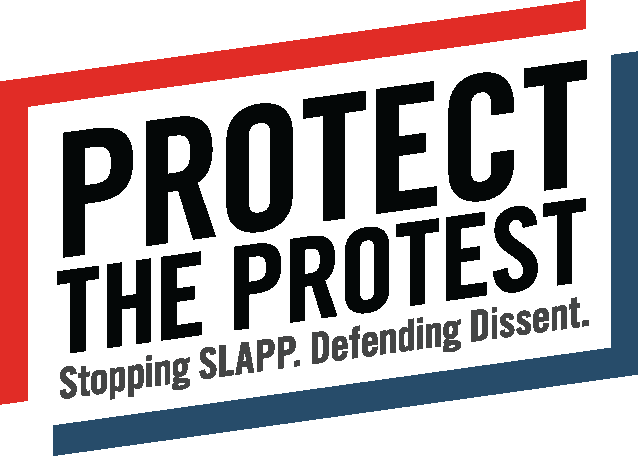Protect the Protest Statement on Energy Transfer v. Greenpeace International et al. SLAPP Verdict
The Energy Transfer v. Greenpeace Lawsuit
Last month, after an eight-year legal battle, a jury in Morton County, North Dakota, found three Greenpeace entities – Greenpeace Inc, Greenpeace Fund, and Greenpeace International – liable for over $660 million in damages in a lawsuit brought by Energy Transfer, the fossil fuel company behind the Dakota Access Pipeline (DAPL). The lawsuit stems from the 2016-2017 Indigenous-led movement against DAPL that brought global attention to tribal concerns about the pipeline’s safety and impact on Standing Rock Sioux Tribe’s water, land, and sovereignty. Energy Transfer alleged that Greenpeace entities engaged in defamation, trespass, and civil conspiracy to delay the pipeline and increase project costs. Representatives for Greenpeace Inc and Greenpeace Fund have announced their intention to appeal the jury verdict.
SLAPPs: Legal Tactics to Silence Advocacy
Protect the Protest is a coalition of legal, advocacy, and movement organizations dedicated to fighting Strategic Lawsuits Against Public Participation (SLAPPs) and other forms of legal attacks that are used by powerful actors to silence free speech and protest rights. Our coalition brings together experienced lawyers, journalists, communications professionals, and activists with expertise in recognizing and challenging SLAPPs.
The Energy Transfer v. Greenpeace lawsuit is widely regarded as a SLAPP intended to silence opposition and those who supported the #NoDAPL protests. When interviewed on a TV news station in North Dakota, Energy Transfer CEO Kelcy Warren said the lawsuit was meant to “send a message.”
SLAPP suits are legal actions designed not necessarily to win on the merits but to burden their targets with costly and prolonged litigation, discouraging public participation and advocacy. Energy Transfer’s lawsuit fits this definition, as it targets Greenpeace’s support of the #NoDAPL movement and seeks to hold the organizations financially responsible for protests that were Indigenous-led. To illustrate this: over 100,000 people visited Standing Rock; Greenpeace Inc. had only 6 employees on the ground at Standing Rock, whereas Greenpeace Fund and Greenpeace International had none. The use of SLAPPs by corporations is a growing threat. These lawsuits can have a chilling effect on advocacy by creating financial and legal risks for organizations and individuals that prevent them from speaking out against abusive corporate practices.
In jurisdictions with strong anti-SLAPP laws, lawsuits like Energy Transfer’s would likely have been dismissed early in the process. However, North Dakota does not have anti-SLAPP protections, leaving organizations vulnerable to prolonged and costly litigation. Strong anti-SLAPP laws provide safeguards against these types of lawsuits and ensure that people can engage in public discourse without fear of excessive legal repercussions.
Concerns About Fairness, Due Process, & Public Access
The fairness of the trial process has also raised concerns. Leading up to the trial, the jury pool in Morton County was exposed to negative media portrayals of pipeline activists, including mailers critical of Greenpeace and other organizations. Soon after filing its lawsuit in Morton County, Energy Transfer made a $3 million donation to the City of Mandan, where the trial was held, for highly visible public projects in the town. Despite several motions by Greenpeace to change venue due to these and other apparent conflicts, the trial court and North Dakota Supreme Court denied the requests.
The First, Sixth, and Fourteenth Amendments to the U.S. Constitution protect the right to a public trial, right to an impartial jury and due process. North Dakota’s own state constitution recognizes the right to trial by jury as “inviolate” and also provides additional guarantees for transparency and access to judicial proceedings. North Dakota Constitution Article I, § 9 states: “[a]ll courts shall be open.” This aligns with Article 14(1) of the International Covenant on Civil and Political Rights (“ICCPR”), to which the United States is a party, that affirms obligations at law for an “independent and impartial tribunal.”
Implications & Next Steps
Throughout history, social movements have challenged unjust laws, institutions, and systems that were once considered acceptable. Often recognized as discriminatory in hindsight, the movements opposing them are now recognized as being on the right side of history. The Indigenous-led movement to prevent an unjust pipeline project that could threaten the water their community relies on should be viewed as such. The legal system is not a static entity; it is shaped by grassroots movements’ engaging, challenging, and drawing attention to where it serves people and communities, and where it fails.
Speaking truth to power is a fundamental part of U.S. society and has a proud lineage that deserves and requires protecting.
The verdict against Greenpeace is a threat to all Americans’ fundamental right to free speech and protest, with significant implications and potential chilling effects for environmental, climate, and social justice movements. If upheld, it could embolden corporations to use the courts as a tool to deter dissent and undermine movements that challenge corporate power. The scale of the damages awarded raises concerns about the future of organizations engaged in advocacy and the broader impact on free speech and public participation in matters of public concern.
Greenpeace Inc. and Greenpeace Fund have announced that they will appeal the verdict, and while we can plan on the North Dakota Supreme Court’s review of the case on appeal, the jury’s verdict could send shockwaves across advocacy organizations that challenge corporate power. These weren’t side effects of the case, they were a core intention.
The outcome of this case underscores the urgent need for stronger anti-SLAPP protections across all jurisdictions. Protect the Protest remains committed to advocating for stronger protections to ensure that concerned individuals and nonprofit organizations can continue to speak up and engage in legally protected advocacy to hold corporations accountable without fear of retaliation. We will continue to work toward this goal while standing in solidarity with Greenpeace and others who are targeted for their advocacy.
Protect the Protest stands with Greenpeace and will continue to fight against efforts to silence public participation.
